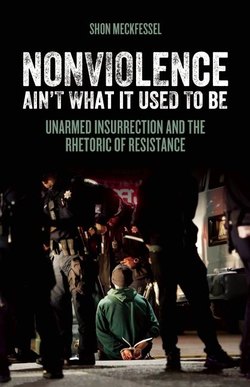Nonviolence Ain't What It Used To Be

Реклама. ООО «ЛитРес», ИНН: 7719571260.
Оглавление
Shon Meckfessel. Nonviolence Ain't What It Used To Be
Acknowledgments
Introduction
Chapter 1: Why Did It Take So Long for People To Riot?
Chapter 2: The Strange Magic of Nonviolence
Chapter 3: The Eloquence of Public Property Destruction
Chapter 4: The Eloquence of Police Clashes
Chapter 5: The Characteristics of Movements to Come
Works Cited
index
Friends of AK
Copyright
Praise for: Nonviolence ain’t what it used to be
Отрывок из книги
Ain’t What It Used to Be
Unarmed Insurrection and the
.....
The passivity or activity of mass-mediated publics has been a heated debate within cultural and media studies since the field’s inception. On the one hand, theorists of the Frankfurt School spoke of the “culture industry,” a depressing, fatalistic, and seamless model of social control, in which masses are passively molded by capitalist culture. On the other hand, there is John Fiske’s “semiotic democracy,” in which audiences, with joyful irreverence, freely go about creating their own meanings to sabotage unequal access to the means of representation. Arguably, however, neither of these models can account for the sort of public that appears in the Tribune’s poll—materially real, yet somehow invisible in all but this one sidebar. The more this material public begins to appear, the more the “average reader” addressed by the paper is revealed as an empty public; ghost-like, disappearing into the realm of the supernatural. How is it possible, one must wonder, that some previously invisible public believes precisely the opposite of the audience that the paper’s consistent editorial policy seeks to discursively constitute, and that they believe so to such an extreme degree? An independent survey cited by “Occupy Research” claims equally surprising results from the businesses surrounding the encampment as well:
Similarly, there was a charge that Occupy Oakland was hurting local businesses, until a survey of local businesses found 80% of 106 shops within two blocks of Oscar Grant Plaza reported a positive or neutral impact from the encampment. In another instance, Police Chief Howard Jordan worried in email to Mayor Quan about how to share the good news of a 19% crime reduction in downtown Oakland during the Occupy encampment. This fact directly contradicted Quan, the City Council, and Oakland Chamber of Commerce’s claim that Occupy Oakland was causing an increase in crime.63
.....